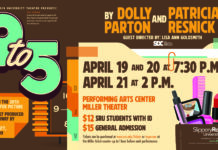The global discussion on autism is one that hits home for sophomore emerging technology and multimedia major Karleigh Santry, 20, for two reasons.
Her father and her brother.
“I don’t care that either of them have a ‘disorder,’ I hate that word. They are two of the best people I know and I love them to death,” Santry said.
Santry’s father is diagnosed with Asperger’s Syndrome, and her brother, PJ, has Pervasive Developmental Disorder (PDD), both of which are highly functioning disorders on the autism spectrum.
“My father was tested for Asperger’s whenever we noticed some social difficulties my little brother PJ was experiencing when he entered elementary school,” Santry said. “Once PJ was diagnosed, we were told that it was believed to possibly be genetic and then we realized that my father shared a lot of similarities with him.”
Santry said her brother PJ does not pick up on most social cues people are used to knowing, like things such as nonverbal communication, body language, or sarcasm.
“My mom would give us a ‘warning look’ as kids and my sister and I would stop whatever we were doing immediately,” she said. “But PJ would just sit there asking what the funny look on Mom’s face was for.”
Santry said her brother can tend to be an open book and will often say exactly what he’s thinking, but admits that he has a good heart despite his difficulties in making friends.
It wasn’t until middle school that Santry’s brother, PJ, now 16, was diagnosed with PDD, and soon after that Santry’s father was diagnosed with Asperger’s.
“My dad has always been a bit on the quiet side,” she said. “He was never very social and went through many different phases where he would become immersed in something and it would be his only focus for a while. But sometimes things go right over his head.”
Santry said she was originally shocked when she discovered her father was diagnosed with something called a disorder, but she said she did not look at him any differently.
“Instead of letting the diagnosis change how I looked at my father, I let the diagnosis
By Rebecca Marcucci
Assistant Campus Life Editor
The global discussion on autism is one that hits home for sophomore emerging technology and multimedia major Karleigh Santry, 20, for two reasons.
Her father and her brother.
“I don’t care that either of them have a ‘disorder,’ I hate that word. They are two of the best people I know and I love them to death,” Santry said.
Santry’s father is diagnosed with Asperger’s Syndrome, and her brother, PJ, has Pervasive Developmental Disorder (PDD), both of which are highly functioning disorders on the autism spectrum.
“My father was tested for Asperger’s whenever we noticed some social difficulties my little brother PJ was experiencing when he entered elementary school,” Santry said. “Once PJ was diagnosed, we were told that it was believed to possibly be genetic and then we realized that my father shared a lot of similarities with him.”
Santry said her brother PJ does not pick up on most social cues people are used to knowing, like things such as nonverbal communication, body language, or sarcasm.
“My mom would give us a ‘warning look’ as kids and my sister and I would stop whatever we were doing immediately,” she said. “But PJ would just sit there asking what the funny look on Mom’s face was for.”
Santry said her brother can tend to be an open book and will often say exactly what he’s thinking, but admits that he has a good heart despite his difficulties in making friends.
It wasn’t until middle school that Santry’s brother, PJ, now 16, was diagnosed with PDD, and soon after that Santry’s father was diagnosed with Asperger’s.
“My dad has always been a bit on the quiet side,” she said. “He was never very social and went through many different phases where he would become immersed in something and it would be his only focus for a while. But sometimes things go right over his head.”
Santry said she was originally shocked when she discovered her father was diagnosed with something called a disorder, but she said she did not look at him any differently.
“Instead of letting the diagnosis change how I looked at my father, I let the diagnosis change how I looked at Asperger’s and all other autism spectrum disorders,” she said.
Santry’s father is not of the average mind. With a genius IQ, he is a four-time Microsoft’s Most Valuable Professional award winner and author on many web development books.
“He is a very successful web developer,” Santry said. “And I look up to him. That is why I hate the stigma attached to autism spectrum disorders because people have a tendency to just think people with them are stupid, or worse, “retarded”.”
Junior psychology major Ashley Snyder, 20, admits that her older brother, Mark, who has a highly functioning form of autism, is very smart in his own way.
“He built a computer just because he wanted to challenge himself,” Snyder said. “He also has a slew of pop culture references at the tip of his tongue.”
Snyder said her brother, who is 28, is a creature of habit and must stick to a specific routine.
“He was diagnosed with Autism as a toddler,” Snyder said. “Since then, he has had a preference for certain food textures. His favorite foods are macaroni and cheese, grilled cheese, Pop Tarts, and potato chips.”
Mark’s eating habits have become easier to manage now, Snyder said, but as a child he would starve himself because he didn’t like the textures of most solid foods.
“He’s a bit awkward and confuses terms sometimes,” Snyder said. “But he cracks jokes like a pro and he is very kind. He isn’t the best with writing or math, yet he loves relaying facts from educational programs.”
Snyder said there are also times when Mark likes to be alone. At family gatherings, he can sometimes be found hiding away in his room because that is what he prefers.
“We don’t question why with a lot of things that Mark does or things that he likes,” Snyder said. “That’s just the way it is with him. For instance he really likes to grow his hair out, simply because he likes the feel of it. He also wears a lot of superhero and comic book shirts because they’re just what he likes.”







